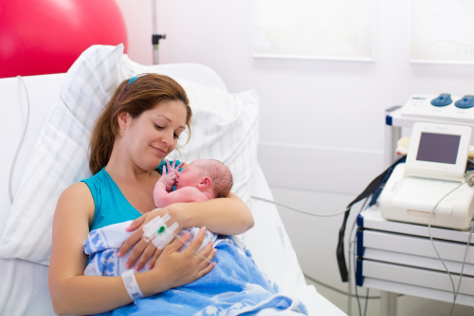The first hour after birth
Here's what you can expect for you and baby straight after giving birth

Immediately after delivery
Once your baby is born and you've both been checked over, it’s important to bond straight away with skin-to-skin contact. If you’ve had a vaginal delivery that has gone smoothly, your baby will be placed directly onto your tummy after birth and will be covered with a warm blanket. It's a mistaken belief that newborn babies need to wear a hat soon after birth. Nowadays, many health professionals recommend that you get to know the smell of your newborn baby - after all it's the best smell ever and helps you both to bond.
Newborns aren’t able to adjust their body temperature very well but there's no need for baby to wear a hat to keep warm as skin-to-skin contact with you will do that. If baby feels cold to the touch your body heats up and if baby feels hot, your body naturally cools down - nature's magic! This step of keeping them warm is important so they don’t lose too much heat and have to use energy to keep themselves warm. Don’t worry about bonding if you’re unable to hold your baby straight after delivery for medical reasons, health professionals will ensure you have plenty of time to do this once they’ve been stabilised.
As you bond with your baby they’ll also be monitored to ensure they are doing well. At one and five minutes after your baby is born the medical staff will evaluate heart rate, breathing, muscle tone, reflex response and colour which is called an Apgar assessment. This test is to evaluate how well your baby has coped during birth and then how well they are adjusting to their new environment. You’ll not have to separate from your baby during these assessments if your baby is doing well.
As well as bonding, your umbilical cord will be clamped and cut by either medical staff or your partner if they want to! Having done this a tube of blood will be collected to check your baby’s blood type and for other tests if necessary.
What is delayed cord clamping?
Cutting the cord immediately after the birth was routine practice for 50-60 years but recent research shows that it is not good for the baby. So now cord clamping is delayed for at least 1-5 minutes (unless babies heart rate is less than 60bpm and not getting faster). Delayed Cord Clamping (DCC) allows the blood from the placenta to continue being transferred to the baby even after they are born and baby can receive up to 30% more cord blood.
Your baby will be weighed and within 24 hours, a health professional will offer to give your baby an injection of Vitamin K. This is an injection to help baby's blood to clot to prevent rare, but serious deficiency bleeding (which could occur in 0.25-1.7 per cent of babies).
Breastfeeding after birth
It’s normal for a baby to start breastfeeding from mum straight after birth if you’re both feeling up to it. Sometimes your newborn might find it difficult to find and stay on your nipple after birth and it may take a while for them to nurse properly, although it will eventually happen within the first hour depending on how things go.
It can be quite difficult at the start so don’t feel shy if you can’t get the hang of it immediately, a member of the team will be there to help you get started.
What if there are post-birth complications?
It may be that your baby has problems after birth and will require a higher level of observation or critical support. If this is the case, your baby may be taken to a radiant warmer in your birthing room. This will keep your baby warm whilst they do further checks. If there are concerns your baby may be taken to an intensive care nursery.
What if I have had a c-section?
If your baby is doing well they will usually swaddle them in a warm blanket and hand them to your partner who can hold them whilst you’re still in the operating room.
After your c-section your baby will be taken to the recovery room with you, and if you’re feeling up to it you’ll be able to breastfeed.